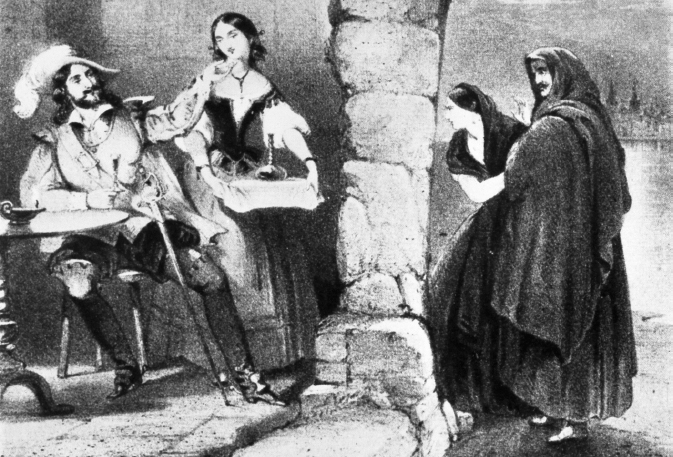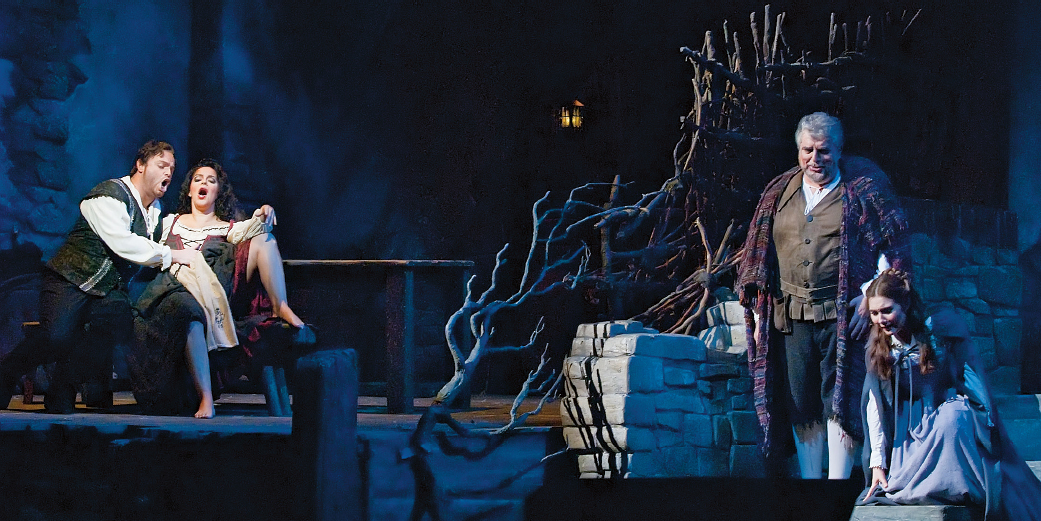Giuseppe Verdi, Rigoletto (1851)
LISTEN
“I want subjects that are novel, big, beautiful, varied and bold — as bold as can be!”
Giuseppe Verdi, 1853
Rigoletto was a daring subject for Verdi to take on, typical of his dramatic choices in its strong situations and violent emotions. For the source of this opera Verdi looked to a play by the literary lion of French Romanticism, Victor Hugo. Hugo’s Le roi s’amuse (The King Amuses Himself) scandalized Paris in 1832 with its depiction of a dissolute, womanizing king and a jester who tries to have him assassinated; it was closed by the police after one performance. When Verdi settled on it the censors, who checked every operatic project in Italy at the time, demanded many changes. (The king was demoted to a mere duke, this apparently making his immorality less offensive.) Scandalous or not, Rigoletto was an immediate success; today it ranks among the most frequently performed operas.
The scene is set during the sixteenth century at the court of Mantua in northern Italy, where Rigoletto is the hunchbacked court jester of the Duke. He is a split character, divided between cynicism and hatred for the courtiers and his shining love for his daughter, Gilda, whom he keeps hidden from sight. The dashing, immoral, and rapacious Duke has gotten wind of her, however, and wants to add her to his list of conquests. Verdi’s Duke of Mantua is descended clearly enough from Mozart’s Don Giovanni.
Through turns of plot we will not trace, the Duke manages to seduce Gilda. She falls in love with him, believing he is a student who returns her love. Rigoletto, meanwhile, can think only of revenge. He hires an assassin, Sparafucile — half comical, but still one of the most menacing characters of nineteenth-
All this, in the terms of nineteenth-
We pick up the action at the beginning of the final act, as Rigoletto brings Gilda to Sparafucile’s hovel to see for herself the Duke’s habits. The scene is split, with the Duke and Maddalena inside the house, Rigoletto and Gilda eavesdropping from outside through a crack in the wall, and Sparafucile moving in between. (We are meant to understand that father and daughter sing to each other, unheard by those inside.)


Recitative A quick rustling gesture in the orchestra signals the Duke bursting in, disguised as a military officer, and demanding service at the inn. Gilda cries out in dismay as she recognizes her “student” lover.
Aria: “La donna è mobile” Waiting for his drink, the Duke holds forth on the fickleness of women. (He should talk!) This brief aria is one of Verdi’s most famous and enduring tunes — one of those nineteenth-
The aria is in strophic form, with each of the two strophes introduced by the orchestra. At the end of each strophe the opening words return as a refrain and lead the melody up to the tenor’s highest pitches. On our recording the tenor adds a brief flourish (a vocal cadenza) at the end of the second stanza, finishing on his highest pitch of all.
Recitative Instead of pausing for applause, Verdi keeps the orchestra moving, repeating the melody of “La donna è mobile” more and more quietly in the woodwinds as Sparafucile comes out to confirm that this is the man Rigoletto wants killed. It is a small but deft touch, turning the jaunty melody of the aria a bit sinister and making it an accompaniment for a quick recitative exchange. Sparafucile exits, leaving Rigoletto and Gilda (outside still) and the Duke and Maddalena (inside) to sing an ensemble — in this case, a quartet.
Quartet: “Bella figlia dell’amore” (Allegro) This is another of Verdi’s most famous inspirations. It begins with a fast section, in which the Duke presses his attentions on Maddalena while she jokingly resists. Meanwhile, outside, Gilda is horrified. These recitative-
Our recording skips the beginning of this section, picking it up midway through. The fast section comes to a stop on a loud, expectant chord, with all four singers joining together.
Andante As a slower movement begins, the Duke, never at a loss for a beautiful tune, takes the lead, pursuing Maddalena with all the suavity Verdi’s melodic genius could muster. His melody is a perfect sixteen measures, four phrases of four measures each, rising to a climax in its third, contrasting phrase: a a′ b a a′.
As he finishes, the other voices start up, one by one. Each sings a distinct melody that captures the emotions at stake: Maddalena laughing at the Duke’s efforts, Gilda sobbing, and Rigoletto stern, determined, bent on revenge. We heard this kind of dramatic characterization through melody in Don Giovanni, in the duet of Giovanni and Zerlina (see page 193).
The Duke joins in, the four voices shift through rich, Romantic harmonies (and modulations) to come to another expectant pause, and then the Duke begins his melody again. Now, however, the others sing with him, and Verdi has skillfully managed their melodies so that each preserves its independent emotional stance in the counterpoint that results. The Andante ends with a long passage for all four voices.
Recitative The lush quartet could not contrast more with what follows: a stark, brusque recitative in which Rigoletto tells his daughter to go to Verona, where he will follow. To sharpen the contrast, Verdi omits the orchestra entirely.
Alas, Gilda does not obey her father’s instructions. She returns to the scene and is murdered, in place of the Duke, during a climactic thunderstorm. Rigoletto comes back to gloat over the dead Duke, but finds instead his daughter, dying; he is left maddened with grief as the curtain falls.
LISTEN
Verdi, Rigoletto, from Act III, scene i
LISTEN
“La donna è mobile”
LISTEN
“Bella figlia dell’amore”
| The stage is divided, showing the inside and the outside of a sordid inn. | |||
| RECITATIVE | |||
| The Duke enters the inn. | |||
| 0:03 | Gilda: | (Ah! padre mio!) | (Ah! dear father!) |
| Duke: | Due cose, e tosto: | Two things, and right now. | |
| Sparafucile: | Quali? | What? | |
| Duke: | Una stanza e del vino. | A room and some wine. | |
| Rigoletto: | (Son questi i suoi costumi.) | (That’s the way he does things.) | |
| Sparafucile: | (Oh il bel zerbino!) | (Big spender!) | |
| ARIA | |||
| 0:29 | Duke: |
La donna è mobile / Qual pium’ al vento, Muta d’accento / E di pensiero. Sempre un amabile / Leggiadro viso, In pianto o in riso / È menzognero. La donna è mobil’ / Qual pium’ al vento, Muta d’accento / E di pensier! |
Woman is fickle, a feather in the wind; Changing her words and thoughts, She’s a lovable, sweet sight, When she’s weeping or laughing, she’s lying. Woman is fickle, a feather in the wind; Changing her words and thoughts! |
| 1:28 |
È sempre misero / Chi a lei s’affida; Chi le confida / Mal cauto il core! Pur mai non sentesi / Felice appieno Chi su quel seno / Non liba amore. La donna è mobil’ . . . |
Man’s always wretched who believes her; If you trust her, watch out for your heart! Yet he’ll never feel happy Who from that breast does not drink love! Woman is fickle . . . |
|
| Sparafucile gives the Duke a bottle of wine and glasses, then goes outside to Rigoletto. | |||
| RECITATIVE | |||
| 2:45 | Sparafucile: | È là il vostr’uom, viver dee, o morire? | There’s your man; does he live or die? |
| Rigoletto: | Più tardi tornerò l’opra a compire. | I’ll be back later to finish him off. | |
| Sparafucile walks off; enter Maddalena, with the Duke inside; Gilda and Rigoletto remain outside. | |||
| QUARTET (from midway through the fast section) | |||
| 0:02 | Duke: | La bella mano candida! | What lovely hands you have! |
| Maddalena: | Scherzate voi, signore. | You’re joking, sir. | |
| Duke: | No, no, | No, no . . . | |
| Maddalena: | Son brutta. | I’m plain! | |
| Duke: | Abbracciami! | Kiss me! | |
| Gilda (outside): | (Iniquo!) | (Villain!) | |
| Maddalena: | Ebbro! | You must be drunk | |
| Duke: | . . . d’amore ardente! | . . . with burning love! | |
| Maddalena: | Signor l’indifferente, Vi piace canzonar? | You couldn’t care less, sir, You like your little joke. | |
| Duke: | No, no, ti vo’ sposar. | No, I mean to marry you! | |
| Maddalena: | Ne voglio la parola. | Give me your word? | |
| Duke: | Amabile figliuola! | Silly girl! | |
| Rigoletto: | (E non ti basta ancor?) | (Isn’t that enough for you?) | |
| Gilda: | (Iniquo traditor!) | (You horrible traitor!) | |
| QUARTET (slow section) | |||
| 0:35 | Duke: |
Bella figlia dell’amore Schiavo son de’ vezzi tuoi; Con un detto sol tu puoi Le mie pene consolar. Vieni, e senti del mio core Il frequente palpitar. |
You gorgeous child of love, I’m enslaved by your charms; With one word you can Stop my suffering. Come and feel My heart pounding! |
| 1:35 | Maddalena: |
Ah! Ah! rido ben di core Chè tai baie constan poco, Quanto valga il vostro gioco Mel credete, sò apprezzar. Son avvezza, bel signore, Ad un simile scherzare. |
Ha, ha, I’m laughing out loud. Talk doesn’t mean a thing; Believe me, I know how much Your game counts for. My dear sir, I’m used To such joking. |
| 1:38 | Gilda: |
(Ah! così parlar d’amore! A me pur l’infame ho udito! Infelice cor tradito, Per angioscie non scoppiar!) |
(Oh, to talk about love like that! The villain has said the same to me! My unhappy, betrayed heart — Don’t burst with anguish!) |
| 1:47 | Rigoletto: |
Taci, il piangere non vale, Ch’ei mentiva sei sicura. Taci, e mia sarà la cura La vendetta d’affrettar. Sì, pronta fia, sarà fatale, Io saprollo fulminar. |
(Quiet! It’s no use weeping. You can see he was lying. Hush, and I’ll take good care To get quick revenge. Yes, it’ll be swift and fatal, I’ll know how to strike him down!) |
| RECITATIVE | |||
| 4:21 | Rigoletto: |
M’odi: ritorna a casa, Oro prendi, un destiero, Una veste viril che t’apprestai, E per Verona parti. Sarovvi io pur doman. |
Listen: go back home, Take the money, get the horse, And the men’s clothes I got you, And ride to Verona. I’ll join you there tomorrow. |
| Gilda: | Or venite. | Come with me now! | |
| Rigoletto: | Impossibil. | I can’t. | |
| Gilda: | Tremo! | I’m frightened! | |
| Rigoletto: | Va! | Go! | |